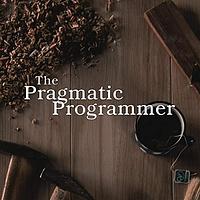Take a photo of a barcode or cover
226 reviews for:
The Pragmatic Programmer: 20th Anniversary Edition, 2nd Edition
David Thomas, Andrew Hunt
226 reviews for:
The Pragmatic Programmer: 20th Anniversary Edition, 2nd Edition
David Thomas, Andrew Hunt
challenging
funny
informative
inspiring
reflective
medium-paced
A great book of advice for any programmer looking to fit into the world of development better.
The book offers knowledge on subjects outside of code from an experienced point of view.
I would have given it five stars if not for the rather dogmatic chapter against object oriented programming. The book should have stuck to topics outside of opinionated design practices.
The book offers knowledge on subjects outside of code from an experienced point of view.
I would have given it five stars if not for the rather dogmatic chapter against object oriented programming. The book should have stuck to topics outside of opinionated design practices.
informative
slow-paced
idk felt like a self help book but for programmers?
funny
informative
inspiring
reflective
slow-paced
informative
inspiring
reflective
slow-paced
While the information can be good to improve your programming, after some time I purchased this book, I was considering a career change and felt the information wasn't applying to me at this time and to focus on helping me transition to a new career.
Pragmatic, technology-agnostic advice for the programmer. Highly recommended.
I have to say, I'm not used to foley work in a non-fiction audiobook. Interesting touch.
I thought a book on programming wouldn't carry over well to audio form. However, the others took pains to keep the code examples very simple and generic.
What I found most interesting is how the authors noted the programming examples are inserted dynamically into the book - it wasn't copied and pasted, it's essentially "compiled" into the text of the manuscript, making it easy to modify, test and "deploy" the code to the book.
I appreciate their commitment to sound password advice and how they debunk oft-heard guidance like "users should have to change their passwords regularly."
Interesting perspective on scrum - and the authors are two of the signatories of the scrum manifesto. They describe how most companies form a "cargo cult" around adopting a few scrum terms and ceremonies, but don't use them effectively, not actually realizing the true purpose of scrum. It seems the purpose it to do whatever is most effective in your situation, to keep experimenting and observing what actually works the best. I appreciate that; in my experience, every tech company claims to follow scrum, but actually doesn't.
I thought a book on programming wouldn't carry over well to audio form. However, the others took pains to keep the code examples very simple and generic.
What I found most interesting is how the authors noted the programming examples are inserted dynamically into the book - it wasn't copied and pasted, it's essentially "compiled" into the text of the manuscript, making it easy to modify, test and "deploy" the code to the book.
I appreciate their commitment to sound password advice and how they debunk oft-heard guidance like "users should have to change their passwords regularly."
Interesting perspective on scrum - and the authors are two of the signatories of the scrum manifesto. They describe how most companies form a "cargo cult" around adopting a few scrum terms and ceremonies, but don't use them effectively, not actually realizing the true purpose of scrum. It seems the purpose it to do whatever is most effective in your situation, to keep experimenting and observing what actually works the best. I appreciate that; in my experience, every tech company claims to follow scrum, but actually doesn't.



